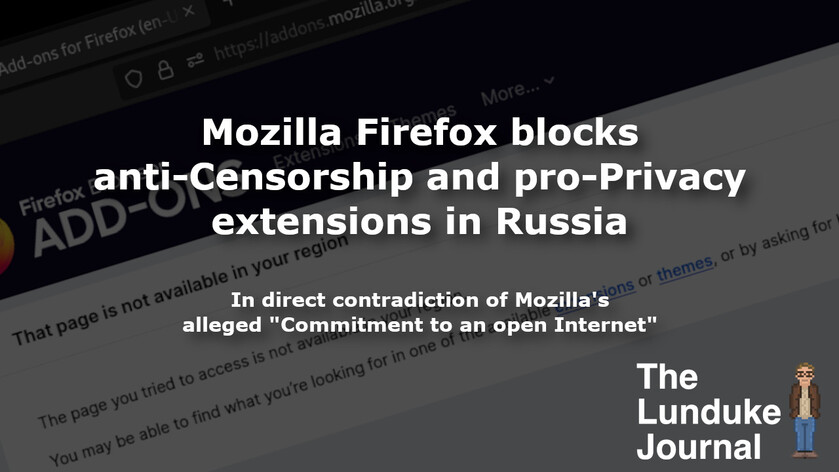Note: This article was updated on June 13th as Mozilla has reversed their censorship of these extensions. Scroll down for the new details.
Mozilla Corporation (the for-profit, mega corporation behind the Firefox web browser) and the Mozilla Foundation (which owns the corporation) have begun banning access to censorship circumvention Firefox Extensions in Russia... in direct contradiction of the company's stated principles.
And this isn't the first time the Firefox maker has pursued a path of censorship of web users.
The Mozilla Principles
The opening statement of the Mozilla Manifesto -- the the documented core values which, supposedly, drive the work of Mozilla and Firefox -- reads as follows:
We are committed to an internet that includes all the peoples of the earth — where a person’s demographic characteristics do not determine their online access, opportunities, or quality of experience.
Likewise, the 2nd principle of the Mozilla Manifesto states:
Principle 2: The internet is a global public resource that must remain open and accessible.
In short: No matter who you are -- or where you live -- you should have open access to the Internet. That is, supposedly, a core part of the vision which drives the development of Firefox.
Mozilla Violating the Mozilla Principles
In the last few days, Mozilla has begun restricting (read: censoring) access to several Firefox Extensions designed to circumvent censorship... for users in Russia.
As of the printing of this article, the following extensions have been banned -- by Mozilla -- in Russia:

VPNs. Proxies. Censorship bypassing tools. Privacy tools. All are listed as "not available in your region" for users within Russia.
A few things that should be noted about this significant change by Mozilla:
- These Firefox Extensions are still available in other regions (including the USA).
- These Extensions were all available within Russia until a few days ago.
- The developers of these Extensions were not notified of this censorship by Mozilla.
- The use of tools designed to circumvent censorship is not illegal in Russia.
- This censorship was implemented by Mozilla... not any government.

The Lunduke Journal reached out to Mozilla with a number of questions.
- Why were these Firefox Extensions banned by Mozilla for users in Russia?
- Was there a request by the Russian government?
- Are there plans to extend this censorship of Firefox Extensions to other countries? (Many similar extensions remain available in countries and locales with far more restrictive laws than Russia.)
- How does the removal of these Extensions fit in with the core principles of Mozilla (outlined within the Mozilla Manifesto)? Will Mozilla be modifying their Manifesto to remove the commitment to an open Internet?
As of the publication of this article, no response has been provided. Likewise, no public statement -- of any kind -- has been made by Mozilla.
This is par for the course from Mozilla, a corporation with a track record of not interacting with critical press.
Open Internet for some... but not for others
The fact that Mozilla is now actively removing access to privacy and censorship-resistance tools -- but only for specific people and groups -- should not be surprising.
This is, in fact, directly in-line with their stated goal of doing "more than deplatforming" of some people (but not others)... a goal their CEO stated back in 2021.
While many of the remaining Firefox users (which is down to roughly 3%) use the browser specifically for Mozilla's perceived commitment to a free and open Internet... that perception appears to be (at best) illusion.
At worst... an outright lie on the part of Mozilla.
Update - June 13, 2024
Mozilla has reversed their censorship of these Firefox Extensions -- and released an official statement which appears specifically written to address the criticism outlined within this article.
On June 13th, the following statement was made by Mozilla Community Manager, Edward Sullivan:
In alignment with our commitment to an open and accessible internet, Mozilla will reinstate previously restricted listings in Russia. Our initial decision to temporarily restrict these listings was made while we considered the regulatory environment in Russia and the potential risk to our community and staff.
As outlined in our Manifesto, Mozilla’s core principles emphasize the importance of an internet that is a global public resource, open and accessible to all. Users should be free to customize and enhance their online experience through add-ons without undue restrictions.
By reinstating these add-ons, we reaffirm our dedication to:
- Openness: Promoting a free and open internet where users can shape their online experience.
- Accessibility: Ensuring that the internet remains a public resource accessible to everyone, regardless of geographical location.
We remain committed to supporting our users in Russia and worldwide and will continue to advocate for an open and accessible internet for all.
More on Firefox (and Mozilla) from The Lunduke Journal:



















